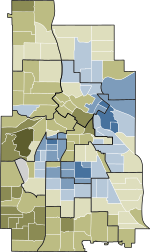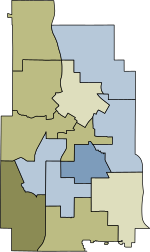
The Green Party of Minnesota is a green political party in the U.S. state of Minnesota. It is affiliated with the Green Party of the United States.
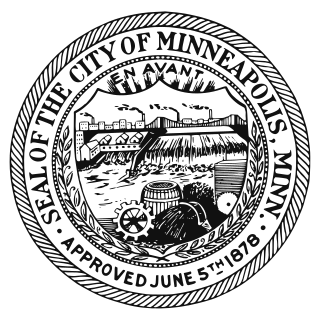
The Minneapolis City Council is the legislative branch of the city of Minneapolis in Minnesota, United States. Comprising 13 members, the council holds the authority to create and modify laws, policies, and ordinances that govern the city. Each member represents one of the 13 wards in Minneapolis, elected for a four-year term. The current council structure has been in place since the 1950s.

The 2005 Minneapolis municipal elections in the U.S. state of Minnesota held a scheduled primary election on 13 September and a general election on 8 November. Voters in the city elected:

Ranked-choice voting (RCV) can refer to one of several ranked voting methods used in some cities and states in the United States. The term is not strictly defined, but most often refers to instant-runoff voting (IRV) or single transferable vote (STV), the main difference being whether only one winner or multiple winners are elected.
A general election was held in Minneapolis on November 3, 2009. Minneapolis's mayor was up for election as well as all the seats on the City Council, the two elected seats on the Board of Estimate and Taxation, and all the seats on the Park and Recreation Board. This was the first election held in Minneapolis that used ranked choice voting, a collective term for instant-runoff voting and the single transferable vote.

The 2013 Minneapolis mayoral election was held on November 5, 2013, to elect the mayor of Minneapolis for a four-year term. This was the second mayoral election in the city's history to use instant-runoff voting, popularly known as ranked choice voting, first implemented in the city's 2009 elections. Municipal elections in Minnesota are nonpartisan, although candidates are able to identify with a political party on the ballot. After incumbent Mayor R. T. Rybak announced in late 2012 that he would not seek a fourth term, 35 candidates began campaigns to replace him. Many of these candidates sought the endorsement of the Minneapolis unit of the Minnesota Democratic–Farmer–Labor Party (DFL), though the convention ultimately ended with no endorsement.
A general election was held in Minneapolis on November 5, 2013. Minneapolis's mayor was up for election as well as all the seats on the City Council, the two elected seats on the Board of Estimate and Taxation, and all the seats on the Park and Recreation Board. Voters were able to rank up to three candidates for each office in order of preference.
A general election was held in the U.S. state of Minnesota on November 6, 2018. All of Minnesota's executive officers were up for election as well as all the seats in the Minnesota House of Representatives, several judicial seats, two United States Senate seats, Minnesota's eight seats in the United States House of Representatives, and several seats for local offices. Special elections were also held for a Minnesota Senate seat and Minnesota's Class 2 U.S. Senate seat. A primary election to nominate Republican and Democratic–Farmer–Labor (DFL) candidates and several judicial and local primary elections were held on August 14, 2018.

The 2005 Minneapolis City Council elections were held on November 8, 2005 to elect the 13 members of the Minneapolis City Council for four-year terms.
A general election was held in Minneapolis on November 7, 2017. Minneapolis's mayor was up for election as well as all the seats on the City Council, the two elected seats on the Board of Estimate and Taxation, and all the seats on the Park and Recreation Board. Voters were able to rank up to three candidates for each office in order of preference.
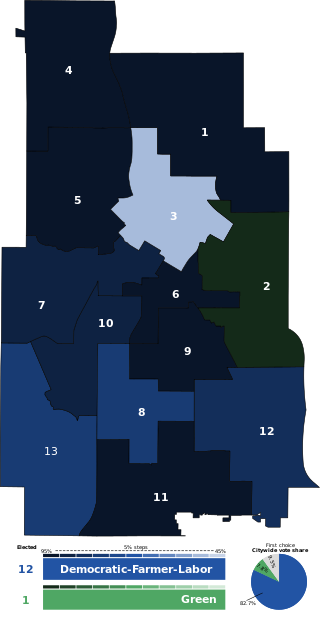
The 2017 Minneapolis City Council election was held on November 7, 2017, to elect the members of the Minneapolis City Council. The political composition remained unchanged, with the Minnesota Democratic–Farmer–Labor Party (DFL) retaining 12 seats and the Green Party of Minnesota one seat. Three DFL incumbents were defeated by intraparty opponents. The new City Council convened on January 8, 2018.
A general election was held in the U.S. state of Minnesota on November 3, 2020. All seats in the Minnesota Senate and Minnesota House of Representatives were up for election as well as several judicial seats, Minnesota's 10 presidential electors, a United States Senate seat, Minnesota's eight seats in the United States House of Representatives, and several positions for local offices. A primary election to nominate major party candidates and several judicial and local primary elections were held on August 11, 2020.
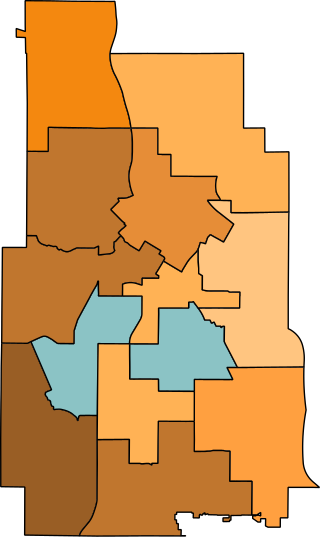
A mayoral election was held on November 2, 2021, to elect the mayor of the U.S. city of Minneapolis. Incumbent DFL mayor Jacob Frey won reelection to a second term, becoming the first Minneapolis mayor to win a second term since R. T. Rybak in 2005. Minneapolis mayoral elections use instant-runoff voting, also known as ranked-choice voting. All candidates appear on the same ballot and there is no primary election, nor is there a runoff. Minneapolis's twin city, Saint Paul, also held a mayoral election on the same day, using the same system.

The city of Saint Paul, Minnesota held an election on November 2, 2021, to elect the mayor. It was held with ranked-choice voting, and there was no primary election. Few candidates filed to challenge incumbent mayor Melvin Carter III, and he easily won a second term with over 60% of first-preference votes.

The 2021 Minneapolis City Council elections was held on November 2, 2021, to elect representatives for all 13 wards of the Minneapolis City Council. These elections occurred alongside the mayoral race and several other municipal offices, including Park Board and Board of Estimate and Taxation positions. The council elections were conducted using a ranked-choice voting system, which allows voters to rank candidates by preference on their ballots.

The 2023 Minneapolis City Council election took place in the city of Minneapolis, Minnesota, United States on November 7, 2023. The Minneapolis City Council is made up of 13 members, with one council member representing each of the city's 13 wards. Typically, council members serve four year terms, but due to census redistricting, the 2021 and 2023 elections were for two-year terms. The 2023 election was the first to elect members to redrawn districts and the first election since the city's form of government moved to an Executive Mayor-Legislative Council structure. The change was prompted after voters narrowly approved a ballot measure in 2021 to shift certain powers from the city council to the mayor. Topics surrounding public safety, affordable housing, rent control, and racial justice were at the forefront of the campaign.

The 2024 Minnesota House of Representatives election was held in the U.S. state of Minnesota on November 5, 2024, to elect members to the House of Representatives of the 94th Minnesota Legislature. Primaries took place on August 13, 2024.
A general election will held in Minneapolis on November 4, 2025. Minneapolis's mayor will be up for election as well as all the seats on the City Council, the two elected seats on the Board of Estimate and Taxation, and all the seats on the Park and Recreation Board. Voters are able to rank up to three candidates for each office in order of preference. City offices are formally nonpartisan, though the offices of mayor and city council allow candidates to list a party or preference.
The 2025 Minneapolis City Council election will occur in the city of Minneapolis, Minnesota, United States on November 4, 2025. The Minneapolis City Council is made up of 13 members representing different parts of the city. Members elected in 2025 will serve four-year terms. Council members will be elected alongside the mayor and other municipal offices.
Katie Jones is an American politician and engineer who is the member-elect of the Minnesota House of Representatives for district 61A in Minneapolis, succeeding Frank Hornstein. Jones is a member of the Minnesota Democratic-Farmer-Labor party. She will be sworn in on January 14, 2025.

